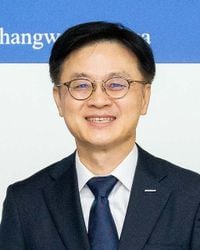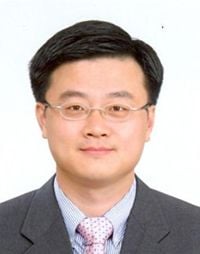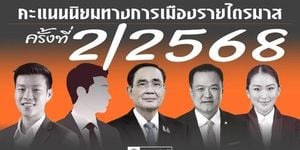Kim Jeong-kwan, the current president of Doosan Enerbility, has been nominated as the first Minister of Trade, Industry and Energy under President Lee Jae-myung's administration, marking a significant appointment on June 29, 2025. This nomination reflects a strategic decision to blend extensive government experience with private sector leadership, aligning with the administration's pragmatic approach to industrial and energy policies.
Born in 1968 in Jangseong, Jeollanam-do, Kim Jeong-kwan's academic and professional journey is marked by a strong foundation in economics and public service. He graduated from Gwangju Jeil High School and Seoul National University with a degree in Economics before earning a Ph.D. in Economics from the University of Missouri in the United States. His entry into public service was through the 36th Administrative Examination, after which he dedicated much of his career to the Ministry of Economy and Finance, now known as the Ministry of Planning and Finance.
Throughout his tenure at the ministry, Kim held a variety of influential roles, including positions in the International Finance Bureau, Foreign Exchange Fund Division, Economic Policy Bureau, and Price Policy Division. His expertise was further recognized when he was dispatched to the International Bank for Reconstruction and Development (IBRD) in the U.S., expanding his international exposure and network.
Kim's career is distinguished by his service in key leadership positions such as Service Economy Division Chief, National Treasury Division Chief, Social Policy Division Chief, Economic Analysis Division Chief, and Comprehensive Policy Division Chief. Notably, in 2015, he became the first director-level personnel to participate in an exchange between the Ministry of Strategy and Finance and the Bank of Korea, where he served as Deputy Director of the International Bureau. His capabilities earned him a swift promotion to Head of the Bank of Korea's Capital Market Department, a role central to the country's financial markets.
After returning to the Ministry of Strategy and Finance, Kim served as Policy Planning Officer in the Planning and Coordination Office, further solidifying his reputation as a policy expert. However, in 2018, he transitioned to the private sector, joining the Doosan Group. Initially, he took on the role of Deputy Head of the Strategy Support Office at Doosan's in-house economic research institute, DLI, which was later renamed the Doosan Management Research Institute, where he eventually became CEO.
In March 2022, Kim was appointed Marketing General Manager (Vice President) of Doosan Enerbility, a core affiliate of the Doosan Group specializing in energy, including nuclear power. His leadership in this role was instrumental in securing significant contracts, such as the Dukovany nuclear power plant project in the Czech Republic, where Doosan Enerbility is part of Team Korea. This achievement has helped the company expand its footprint in the global market for future energy industries, including Small Modular Reactors (SMRs) and wind power generation.
Kim's nomination as Minister of Trade, Industry and Energy is widely regarded as a strategic choice to accelerate the administration's renewable energy transition goals. His combined experience in economic policy and real-world industry management positions him uniquely to implement President Lee's energy mix philosophy with both expertise and execution capability. As Kang Hoon-sik, the Presidential Chief of Staff, stated during the June 29 briefing, "Kim Jeong-kwan will implement the President's philosophy focusing on growth, as he is a key talent with experience in both economic bureaucracy and the real economy." This underscores the administration's confidence in his ability to drive growth while navigating complex industrial and energy landscapes.
Despite his extensive background, Kim's appointment surprised some within the Ministry of Industry, as he lacks prior experience working directly within that ministry. An official noted initial confusion, mistaking him for Yeo Han-gu, a former Vice Minister of Knowledge Economy, due to the similarity in names. Nonetheless, Kim's relatively young age for such a high-profile post and his peer status with Yeo Han-gu—both being graduates of the 36th Administrative Examination—highlight a generational shift in government appointments. Meanwhile, other key figures appointed alongside him, like Koo Yoon-cheol, nominated as Deputy Prime Minister for Economy, belong to earlier examination cohorts, indicating a blend of experience and fresh perspectives in the administration.
Given Kim's leadership at Doosan Enerbility, a leading player in nuclear power, there has been speculation about potential shifts in the government's nuclear energy policies. However, the Presidential Office clarified that Kim's nomination is unrelated to changes in nuclear or broader energy policy directions. Instead, they emphasized that he is the right person to embody and advance President Lee's energy mix vision, which balances various energy sources to achieve sustainable growth.
Kim's career trajectory—from a highly regarded policy expert in the Ministry of Planning and Finance to a corporate executive leading a key energy firm—illustrates a rare blend of public and private sector experience. His move to Doosan was reportedly met with regret by many senior officials who valued his policy acumen. This background equips him with a comprehensive understanding of both the intricacies of government policy formulation and the practical challenges faced by industry players, a combination deemed essential for driving South Korea's industrial and energy agendas forward.
As the Lee administration embarks on its ambitious plans to transform the nation's energy landscape, Kim Jeong-kwan's appointment signals a commitment to pragmatic, growth-oriented leadership. His expertise in economic policy, coupled with hands-on experience in the energy sector, positions him to navigate the complex dynamics of domestic and international markets, technological innovation, and environmental considerations.
In sum, Kim Jeong-kwan stands at the nexus of government policy and corporate strategy, embodying the Lee administration's vision for a balanced and forward-looking approach to trade, industry, and energy. His nomination not only reflects confidence in his abilities but also marks a pivotal moment in South Korea's pursuit of sustainable industrial and energy development.





